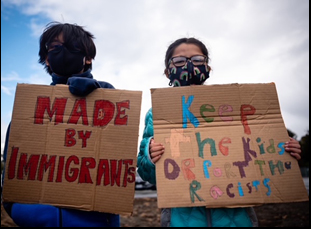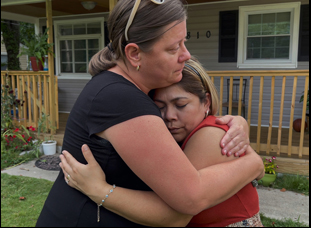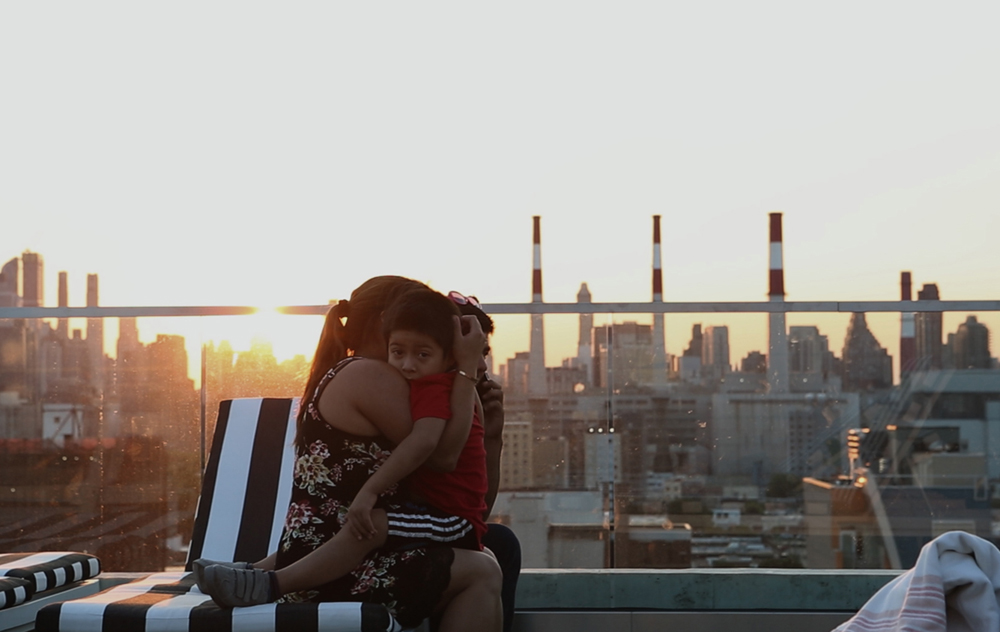It wasn’t by intention that Immigrant Families Together attracted attention from women in the entertainment industry, but as “Split at the Root” wears on, it can’t go without notice that among the organization’s many volunteers and staff there are former script supervisors and theater directors, all of whom know the amount of cooperation and collective energy it takes to mount a successful production, only doing so for IFT comes with far higher stakes. Started in the wake of the Trump Administration’s reckless and cruel border separation policy, cutting ties between parents and their children, IFT works to facilitate reunions, posting bond for the undocumented who find themselves in legal limbo and offering all manners of support as they await decisions on if they’ll be granted asylum. If IFT had to mobilize quickly, immediately emerging as an impressive movie-worthy coalition predominantly made up of working professional women after protests against the policy turned towards taking legislative action, it was matched only by the speed with which a strong all-female crew of producers came together to document their efforts, a group headlined by Rosario Dawson and Lana Parrilla and bolstered by the work in the trenches by “Dietland” creator Marti Nixon and “Swiss Army Man” producer Miranda Bailey.
Under the auspices of director Linda Goldstein Knowlton, who previously documented a social justice revolution in Oakland with “We Are Radical Monarchs,” “Split at the Root” channels all that power behind the scenes into a galvanizing film as it presents IFT deftly navigating the mad scramble to untangle complicated situations amidst the chaos unleashed by such a rash administrative decision and comes to center on two women originally hailing from Guatemala whose lives are very much in flux because of it. There might not be an organization if it weren’t for Yeni Gonzales memorizing the names of all the women she met in the detention center where she was told her own children were going to be sent to the “icebox” while she would likely be deported back to Guatemala, giving IFT founders Julie Schwietert Collazo and Francisco Collazo a list to begin their work of rejoining families and after establishing themselves, IFT comes to take on Rosy, a mother who fled Guatemala after her husband was killed and survived being shot at twice herself, though the pain would seem to pale in comparison with losing touch with her daughters as she awaits her day in court.
“Split at the Root” may depict the wrenching experience of such detachment, but offers a considerable degree of hope in the ingenuity and networking that goes into making IFT a watchdog across the U.S. with lawyers’ numbers being passed around detention centers and public demonstrations in the streets to make sure these broken families are recognized in a currently unjust system. That bullhorn is bound to get a little louder this week as the film premieres on Netflix via ARRAY, making it available to watch around the world and recently Knowlton kindly sat down to talk about a making a movie that has already become something far more, putting together a crew that could handle the sensitivities of inherently combustible subject matter and how the film fits into an ongoing series of films she’s made about strides towards a more equitable society.

It’s very true. When the zero tolerance policy became public — because they were quietly doing it for a while — I was just vibrating with horror and incredulity that we are doing this, that it’s Nazi Germany, among other things. I just had to do something boots on the ground, and I saw this organization called Never Again Action Now was putting together an act of civil disobedience to shut down the GEO group in L.A. They’re one of the two for-profit detention center companies in the United States. And I [felt] “I’m a past middle-age white woman who has the privilege to go get arrested because I know that I’ll be okay.” So I joined this group and actually Anayvette [Martinez] from We Are the Radical Monarchs said, “Make sure there’s an arrest plan,” so there was a whole group of us, about 25 people, and it was very well-organized and we were very successful in shutting it down, and we were arrested.
Of course, because we’re in the world that we’re in right now, I posted my arrest photo on Instagram and by crazy coincidence, it was the same day that Marti Noxon, who I worked together with before on “Code Black” was in New York meeting with Julie, the co-founder of Immigrant Families Together. Marti had made a very generous donation to them and wanted to meet with Julie in person to see “What else can I do?” And Julie said, “Tell their story.” So again, by crazy coincidence, she’s scrolling through Instagram that night and messages me after she sees my photo and says, “Well, when you get out of jail, call me because I have your next project.” Marti and I have been friends for a long time and we very much align in our values, so I wasn’t surprised that she was meeting [with] and supporting IFT and it just was kismet of timing.
What was it like gathering a crew for this? I understand for instance your co-cinematographer actually had her own immigration experience to draw on, so it seems like you put it together really conscientiously.
Yeah, absolutely. I’ve worked with a lot of the same people over the many, many years I’ve been making films and because my films are about people in potentially vulnerable situations, I’ve purposefully created teams to work with who get that on every single level. One of my cinematographers Nelson Hume, I’ve worked with for 150 years, give or take. [laughs] I met him actually on “The World According to Sesame Street,” which was 20 years ago and I call him and our sound mixer, Ben Posnack, I call them my work husbands. I’ve traveled around the world with them for the last 20 years working on films.
And then Nelson introduced me to Nancy [Serna Guerrero], who is our co-cinematographer and she started out as an assistant camera and DIT working with Nelson, and she has been now shooting herself. She’s from Mexico and is a native Spanish speaker and she also just recently had gotten citizenship in the United States. She wasn’t able to go back to see her mother for 10 years, so she had a very intensely personal connection with the story and was especially primed to join our team. She was just absolutely amazing, and we had many shoots where she really did many, many, many jobs, including shooting – reading, AC, DIT, translating. I relied on her so much and she’s just really brilliant.

Yeah, I have a dear friend named Meg LeFauve, a brilliant writer who wrote “Inside Out,” among many other things, and she has this amazing ability to look at someone’s work. A bunch of years ago, she said to me, “Well, your theme is you want to tell stories about people who are striving without knowing what’s going to happen,” [where it’s] not, they’re going to try their hardest or go against the odds, [but] like the women who started the Radical Monarchs, they’re [simply] like, “We’re going to do this.” You don’t know how it’s going to come out. They have the best of intentions, the best of ideas and they see the big picture and all of that, but it’s about people striving and I really want to tell people stories who do that because it’s really heroic. They’re going to do that thing. They’re stepping out on the ledge and going to follow through with this idea that they believe in.
I also feel like a thread in my stories about creating community and maybe the essence of community is that you belong, so you [feel] valued and you’re not alone. You have the women of IFT and they’re going to make sure that these mothers who are risking everything to save their children are seen and heard and taken care of and that they belong.
Beyond Yeni and Rosy, was it difficult to figure out how to tell such a sprawling story?
From the very beginning, we recognized that there are these badass women from both sides of the border that are making decisions to make the impossible happen. Rosy and Yeni travel from Guatemala with their families and they’re the impetus for IFT starting, that was the impetus for how we’re going tell the story and we knew that from the beginning that we were going to tell these parallel stories. Then in terms of Rosy and Yeni, we wanted to make sure that it was a personal story, because you see the news [with] thousands of people at the border and all this incendiary language and giant numbers that people can’t really comprehend. We had the opportunity to have Yeni and Rosy tell their stories, which they had already been doing in various ways, but in getting to know [them and their] motivations and [understand] they’re trying to put food on the table and they’re trying to make a better life for their children — that’s who those giant numbers are. They all have individual lives, health issues, feelings, fears, desires, so that was a really important aspect of how we were going to tell the story.
When they have so much going on in their lives including the intrusion of COVID, was it difficult to get the participation you wanted?
It was very tricky but very empathetic. The difficult part of wanting to amplify this story and to personalize it was that it meant that Yeni and Rosy had to re-live trauma, so that was a big conversation that we had ahead of time. If you want to participate in this, how do you feel about it? You can have the camera stop anytime, but all of the steps along the way of telling their stories, it’s so emotional and raw and ongoing, so beyond being heroic in terms of making this journey with their children, they also separately said, “Yeah, I want to tell this story because it could help other people. I don’t want them to feel alone. I want them to understand that there are resources and it’s hard and we’re getting through it and there are people who care about you.” So [we] started from that place and yeah, I don’t know that I’ve ever worked with a collaborator or a protagonist before who works six days a week and has one day with their children, so how do we balance that? [It was a] high class problem for me, but for Rosy it’s a real day-to-day situation. So every film has their own challenges.

First of all, we really thought — and I will never say this again — [it was going to be] a year in the life. [laughs] We wanted to get the story out as soon as possible to try to influence legislation and make noise. Then we saw that the stories were continuing and growing, and you can make a film forever, but people’s lives were really changing in such unexpected ways, so we were like, “Okay, we’re gonna film a little bit longer” and then it was COVID, so it became the story of their lives through the pandemic. We really wanted to get it out before the 2022 midterms, which we did when we premiered at South By, but now this platform with ARRAY and Netflix, it’s like, okay, now we’re going to make big noise.
It seems like the line of badass women continues with ARRAY…
Oh my God, it was a dream come true. We premiered at South By and screened at other festivals and we were getting positive responses from distributors about the film, yet it’s such a difficult topic. The world is so hard and [we were told] “We’re really looking for sports documentaries or celebrity documentaries or true crime documentaries and I’m like, “This is true crime. If you want true crime, I’m handing it to you on a platter.” And they’re like, “Yeah, well, not that kind of true crime.” So it’s a hard time for a lot of filmmakers and we’re so fortunate to have a partner and an executive producer in Rosario Dawson. It’s funny because she was at South By to do press for “DMZ” that Ava [DuVernay] directed and produced, so as we were talking about strategy, I was like, “Hey, Ava has this amazing company called ARRAY, and this is what they do because they’re all about taking important, moving, people-centered, social justice [projects] — look at the films that they distribute. They’d be perfect.” So Rosario was like, “All right, let me text Ava.”[laughs]
I actually interviewed Ava a long time ago, and it was just before it was announced that she was going to do “Selma,” so it was this amazing time and she’s been so supportive along the way, like with “We Are the Radical Monarchs,” and she’s got a pretty giant reach. So it’s this full circle thing and she also walks the walk and talks the talk and being able to work with her now is pretty spectacular. When Rosario told me that Ava saw the film and wanted ARRAY to acquire it, I was like, “how could it be more perfect?” It can’t.
“Split at the Root” will start streaming on Netflix on March 3rd.




